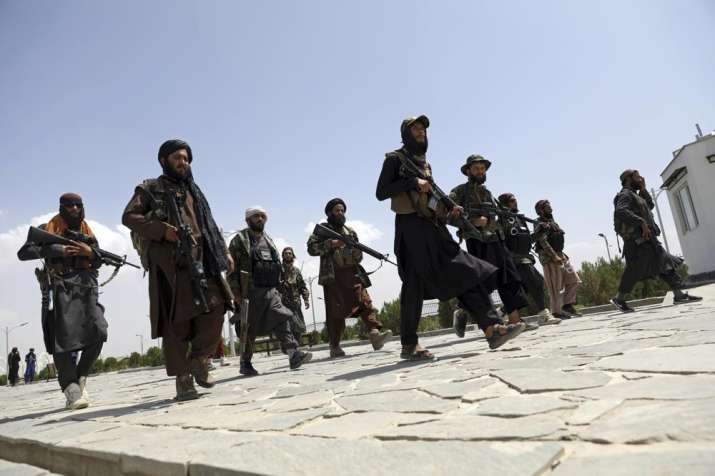
Taliban fighters patrol in Kabul, Afghanistan.
Lightning-fast changes in Afghanistan are forcing the Biden administration to confront the prospect of a resurgent al-Qaeda, the group that attacked the US on September 11, 2001, as well as preventing violent extremism at home. Trying and cyber attacks from Russia and China.
With the rapid withdrawal of US forces and the rise of the Taliban in Afghanistan, “I think al-Qaeda has an opportunity, and they are going to take advantage of that opportunity,” says Chris Costa, who heads the counter-terrorism department. was the Senior Director. Trump Administration.
“This is an encouraging event for jihadists everywhere.” Al-Qaeda’s rank has been significantly reduced by the 20-year war in Afghanistan, and it is unclear whether the group has the potential to carry out devastating attacks such as the 9/11 attacks on the US in the near future, particularly Given how the US has reinvented itself over the past two decades with surveillance and other protective measures.
But a June 1 report by the UN Security Council said the group’s senior leadership is present inside Afghanistan along with hundreds of armed operatives. It noted that the Taliban, which harbored al-Qaeda fighters prior to the September 11 attacks, “is based on friendship, shared conflict, ideological sympathy and a history of endogamy.”
Pentagon spokesman John Kirby acknowledged Friday that al-Qaeda has a presence in Afghanistan, although it is difficult to quantify because of the country’s low intelligence gathering capacity and “because they don’t have IDs.” and register somewhere.”
Even inside the country, al-Qaeda and the Taliban represent the only two immediate counterterrorism concerns, as evidenced by the restlessness about the prospect of Islamic State attacks against Americans in Afghanistan over the weekend as US forces seek evacuations. was forced to develop new methods. To the airport in Kabul. The Taliban and IS have fought each other in the past, but there are now concerns that Afghanistan could again become a safe harbor for many extremists determined to attack the US or other countries.
President Joe Biden has repeatedly called for what he calls “over-the-horizon capability” which he says will enable the US to remotely monitor threats of terrorism. His national security adviser, Jake Sullivan, told reporters on Monday that Biden has become clear that counter-terrorism capabilities have developed to the point where the threat can be suppressed without a strong boots-on-the-ground presence. He said the intelligence community does not believe al-Qaeda currently has the capability to attack the US
The US is also anticipating that airport screening and more sophisticated surveillance may be more effective in thwarting an attack than it was 20 years ago. But experts worry that the ability to gather essential intelligence as a pre-warning system against an attack will be negatively affected by the military’s withdrawal.
An additional complication is the enormous amount of national security threats that the US government was facing prior to the September 11 attacks. These include sophisticated cyber operations by China and Russia that can cripple critical infrastructure or steal sensitive secrets, nuclear ambitions in Iran and a growing domestic terrorism threat highlighted by the January 6 uprising in the US Capitol.
FBI Director Chris Wray has described that domestic threat as “metastasizing,” with the number of arrests of white supremacists and racially motivated extremists nearly tripling since their first year on the job.
“My concern is that you can’t compare 2001 to today,” said Georgetown University terrorism expert Bruce Hoffman. “There is a much broader and better organized bureaucracy,” he said, “but it is not particularly burdened with demands related to terrorism.”
Hoffman said that although he did not think that al-Qaeda would be able to quickly use Afghanistan as a launchpad for attacks against the US, it would work with its allies to further encourage attacks in the region. I can restore my “coordinating work”. – A patient strategy that has yet to be justified.
“Terrorist groups do not conform to train timetables or flight schedules,” Hoffman said. “They work when it suits them and, as al-Qaeda was doing, they quietly lay foundations in the hope that that foundation will ultimately influence or determine their success.”
The concern is resonant enough that Biden administration officials told Congress last week that, based on the evolving situation, they now believe terrorist groups such as al-Qaeda are capable of growing much faster than expected. can be. In June, top Pentagon leaders said an extremist group like al-Qaeda may be able to reproduce in Afghanistan and pose a threat to the American homeland within two years of a US military withdrawal.
The September 11 attacks made al-Qaeda the most internationally recognizable terrorist group, but for at least the past decade, the most powerful threat inside the US has come from Islamic State-inspired individuals, resulting in fatalities in the San. Massacres have happened. Bernardino, California and Orlando.
But al-Qaeda hardly disappeared. US officials alleged last year that a Saudi gunman who killed three American sailors at a military base in Florida in 2019 communicated with al-Qaeda operatives about plans and tactics. Last December, the Justice Department charged a Kenyan man with attempting a 9/11-style attack on the US on behalf of the al-Qaeda-linked terrorist organization al-Shabaab.
It is now possible that other extremists will find themselves inspired by al-Qaeda, even if not directed by it. “Recently, I would have said that the threat from the al-Qaeda corps is quite minor. They did not have a safe haven in Afghanistan, their senior leadership was scattered,” said Nathan Sales, former coordinator of counterterrorism at the State Department.
But, now with the Taliban back in control, “all of this can and will change very quickly.”
Read also: UK Prime Minister Boris Johnson to convene G7 meeting today for urgent talks on the situation in Afghanistan
Read also: UNHCR urges Afghanistan neighbors to keep borders open to potential refugees
.